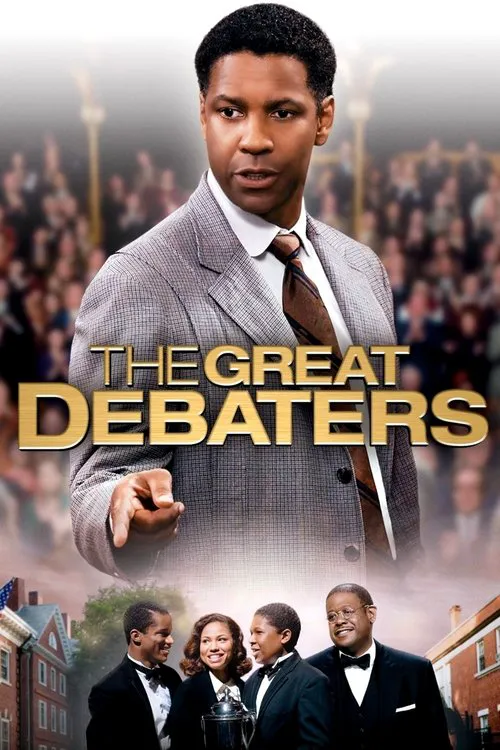The Great Debaters

Plot
In the heart-wrenching and uplifting drama "The Great Debaters," director Denzel Washington brings to life the remarkable true story of Melvin B. Tolson, a charismatic debate coach who revolutionized the world of competitive debating at Wiley College, a predominantly African-American institution in Texas during the 1930s. With his unorthodox teaching methods and unwavering passion for the power of words, Tolson transformed a group of struggling students into a formidable debating force that took on the intellectual titans of Harvard University in a series of electrifying matches. The film is set in the 1930s, a time when the Great Depression had ravaged America, and racism was an entrenched and accepted part of everyday life. At Wiley College, a small, struggling institution in Texas, a group of African-American students were largely seen as second-class citizens, relegated to menial jobs and low-paying positions. Among these students was James Farmer Jr., a bright and ambitious young man who was desperate for a way out of the bleak situation. When he stumbles upon a debate team tryout, Farmer sees an opportunity to change his fate and sets out to join the team. Enter Melvin B. Tolson, a professor of English and debating coach at Wiley College. Tolson is an unconventional educator who believes that the art of debating is not just about winning arguments but also about developing critical thinking, public speaking, and analytical skills. A radical thinker and a fervent advocate for social justice, Tolson uses his debate team as a platform to challenge the status quo and promote equality and understanding. Despite his unorthodox methods and progressive views, Tolson is a natural leader who inspires and motivates his students to push beyond their limits. As Tolson begins to mentor the debating team, he discovers that they are woefully unprepared for the competitive world of debating. The team struggles to articulate their arguments, stumbles over their words, and lacks the confidence to express themselves. Tolson sets out to change this, teaching his students the art of persuasion, the power of storytelling, and the importance of critical thinking. He pushes them to read classic literature, to analyze the world around them, and to develop their own unique voices. As the team begins to gel, Tolson introduces them to the concept of the "syllogism," a fundamental building block of logical thinking that has the power to dismantle even the most entrenched arguments. He also teaches them the art of " counter-debating," which involves anticipating and responding to their opponents' arguments with speed and agility. Through his unorthodox teaching methods, Tolson transforms his students into confident, articulate, and formidable debaters who are ready to take on the best of the best. The stakes are high when Tolson decides to send his team to compete against the debating champions of Harvard University. The Harvard team, comprised of affluent and well-educated students, is confident in their superiority and looks down on the Wiley College team as inferior. Tolson knows that his team faces a daunting task, but he believes that they have the talent, the skill, and the courage to pull off an upset. The debate against Harvard becomes a defining moment for the Wiley College team. Led by Farmar, the team must navigate the complexities of debating against opponents with vastly different life experiences and perspectives. As the debate rages on, Tolson watches with pride as his students hold their own against the Harvard team, using their newfound skills to dismantle their opponents' arguments and make a compelling case for their own position. In the end, the Wiley College team emerges victorious, defeating Harvard in a stunning upset. The victory is not just a testament to the team's debating skills but also a reflection of Tolson's unorthodox teaching methods and his commitment to empowering his students. As the film concludes, the audience is left with a sense of hope and optimism, knowing that the power of education can transform lives and challenge even the most entrenched social norms. "The Great Debaters" is a powerful and uplifting film that celebrates the transformative power of education and the human spirit. With its talented cast, engaging story, and Denzel Washington's masterful direction, the film is a must-see for anyone who has ever doubted themselves or been marginalized by society. As Tolson's students prove that they are capable of achieving greatness, the film reminds us that everyone has the potential to make a difference and that the power of words can change the world.
Reviews
Recommendations




